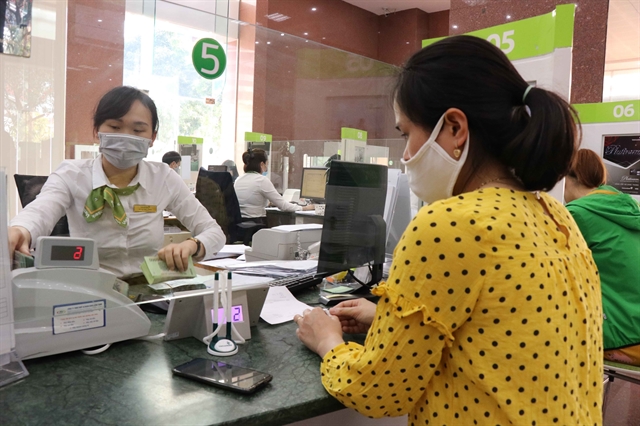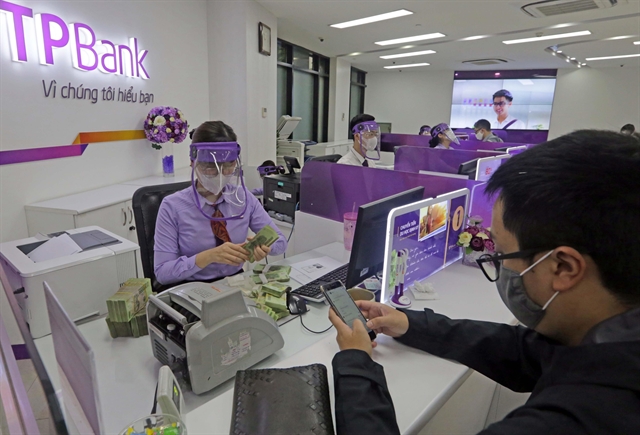
Minister of Industry and Trade Trần Tuấn Anh talks with ASEAN Secretary-General Lim Jock Hoi. — VNA/VNS Photo
The COVID-19 pandemic has not only affected people's health but also disrupted supply chains, negatively affecting the global and regional economy. Minister of Industry and Trade Trần Tuấn Anh talks with Vietnam News Agency about plans for economic recovery, and the Special ASEAN Plus Three Summit on Coronavirus Disease 2019 (COVID-19) that was held via video conference.
How has Việt Nam used its role as 2020 ASEAN Chair in coping with the economic fallout due to the COVID-19 pandemic?
It is a special year for Việt Nam in holding the ASEAN Chairmanship, as the world is dealing with the COVID-19 pandemic, which has seriously hindered trade and cooperation at all levels and in all forms.
Along with important initiatives of the Vietnamese Government, the focus of the ASEAN Chairmanship Year 2020 has more requirements and new contents from the pandemic’s impact on the economies and trade of countries across the world, including Việt Nam.
Therefore, with the task of fulfilling the role of the ASEAN Chair and achieving important priority goals, Việt Nam has actively built an appropriate action plan.
First of all, Việt Nam has put forward a new scenario to ensure the effectiveness of intra-ASEAN cooperation as well as cooperation with partners, that includes the replacement of conferences from live to online, while giving solutions to ensure the efficiency and quality of such conferences.
Regarding the perspective of the commercial economy, COVID-19 has had serious impacts on trade and investment as well as the production of businesses and people in all countries, including Việt Nam.
As a result, the January-April economy of Việt Nam and the world were negatively affected. Many economies have been on the verge of recession. ASEAN is not excluded from such impacts.
The statement by the ASEAN Chair 2020, released by Prime Minister Nguyễn Xuân Phúc on February 14, focused on strengthening cooperation and solidarity among ASEAN countries to cope with COVID-19. The initiatives and statements of the ASEAN economic ministers, ASEAN-Japan economic ministers and ASEAN+ 3 leaders have all focused on practical goals, gradually recovering trade and economy as well as joint cooperation frameworks of ASEAN and between ASEAN and its partners.
In ASEAN, the pandemic has caused the disruption of supply chains. The shortage of supply from South Korea and China, where are seriously affected by the outbreak, has broken the production chains of textiles and garment, footwear, furniture, electronics and many others, impacting the export capacity of ASEAN countries.
In addition, the outbreak has also worsened the production activities of industrial economies, including Việt Nam and ASEAN countries, leading to stagnation, especially in the ASEAN economic community, which are mostly small and medium enterprises.
Major exporting countries, including Việt Nam and the ASEAN bloc, have never experienced such sharp declines. Many countries saw negative growth in exports over the last few months.
However, the region’s demand has not been reduced thanks to efforts of disease prevention from Việt Nam and ASEAN countries, especially diverse solutions for food security and cooperation to ensure general security, stabilise people's lives and socio-economic development.
Could you tell us about conversations with ASEAN Secretary-General Lim Jock Hoi on economic recovery and supply chain maintenance?
This is an implementation plan that the Ministry of Industry and Trade (MoIT) has built in the framework of the ASEAN Chairmanship Year 2020.
The MoIT had a series of phone calls with ministers of Japan, South Korea, Singapore and many other partners to discuss the intra-ASEAN cooperation framework as well as priority issues needing to be deployed continuously.
In my talks with ASEAN Secretary-General Lim Jock Hoi, we focused on a number of major points to prepare for the joint initiative of the ASEAN-Japan economic ministers and the joint statement on coping with COVID-19.
Our conversation also pointed out joint initiatives between ASEAN ministers and ministers of partner countries such as Japan, South Korea and China to cope with the pandemic and continue restoring the links between ASEAN and partner countries.
We discussed in depth the implementation of signing agreements in Hà Nội this year with the coordination between the ASEAN Secretariat and Việt Nam, as well as with other partners, especially India.
The two sides also talked about restoring supply chains in the region, in which Việt Nam is not only holding the ASEAN Chairmanship but also one of the largest food exporters.
The Government's efforts to make a decision on lifting the restrictions of mask exports were highly appreciated by the ASEAN Secretariat, which considered Việt Nam a model of ASEAN's responsible member country.
The final point is the joint efforts to promote an action plan that integrates joint initiatives into multiple channels and sectors towards restoring the economy of Việt Nam, ASEAN and the world.
To turn it into reality, it requires great flexibility, determination and effort that must show the role and commitment of the governments of ASEAN countries to the business community.
What is Việt Nam’s plan for regional cooperation to cope with the pandemic, even after it is controlled?
By efforts and coordination with ASEAN countries, Việt Nam has identified that businesses, especially small- and medium-sized enterprises, need the Government's support mechanisms and policies.
Việt Nam will consider supporting resources and policy mechanisms for businesses within the framework of international cooperation and in accordance with the general principles of the World Trade Organisation, helping them overcome difficulties and restore production and business activities.
Việt Nam has agreed to give top priority to reviewing the legal frameworks on investment and production environment to continue facilitating procedures for market access and investment activities.
In particular, Việt Nam will continue to create conditions for businesses to promote connections among economic sectors, regions and countries, especially new technology in commerce to overcome limitations and obstacles in disease prevention, social distancing and economic closure.
The COVID-19 pandemic revealed many weaknesses of ASEAN economies. Therefore, ASEAN needs to have stronger efforts, new appropriate policies and closer connections between ASEAN and partner countries in order to restructure the supply chain, ensuring the ASEAN economies’ rapid and effective adaptability to deal with new risks in the future. — VNS





























